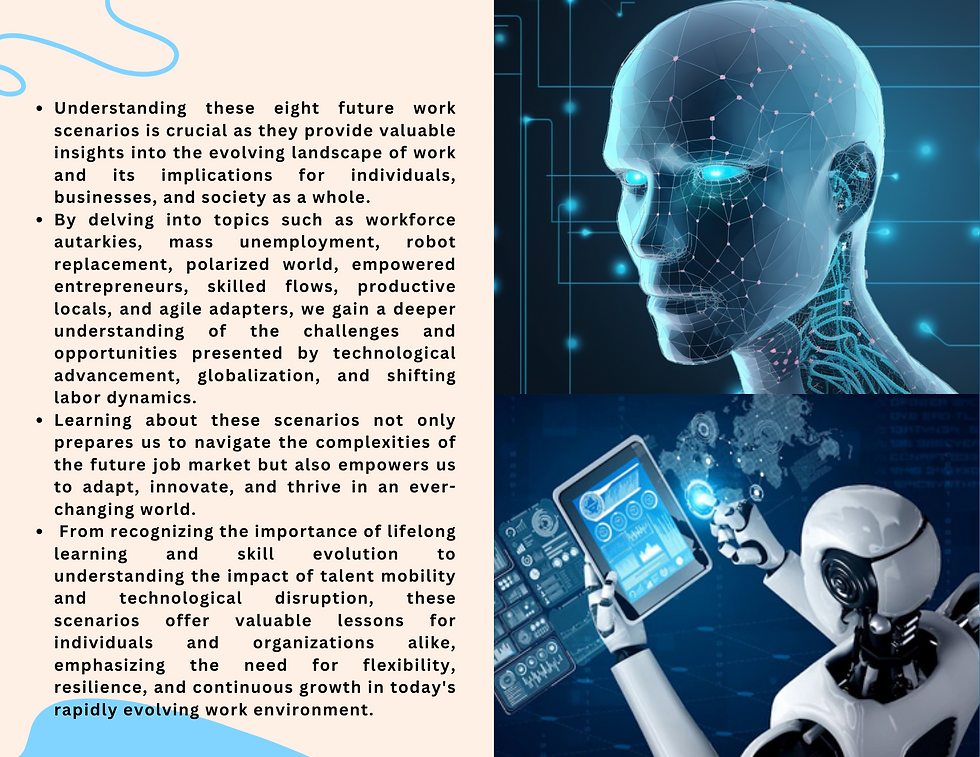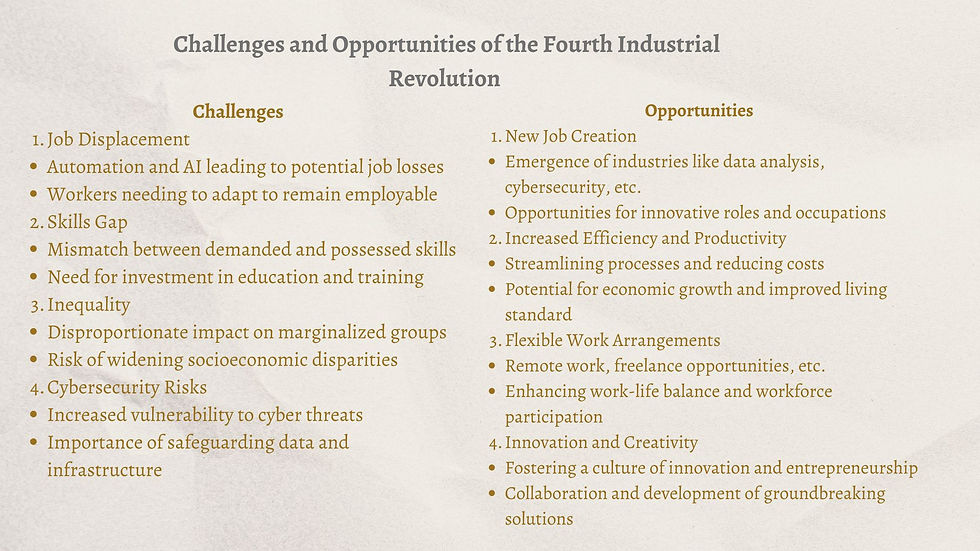SESSION 1: LEADING SELF
- Chimi Dema
- Mar 23, 2024
- 3 min read
Updated: Jun 10, 2024

My Takeaway from 8-Futures of Work Scenarios and Implementation, 2018.

Theory U

Take away from Theory U- Theory U is a way of looking at how we change and learn. Imagine a journey shaped like the letter "U." At the top, we start by just doing things the same way, without thinking about it. That's like being on autopilot. But as we go down the "U," we start to wake up and see things differently. We pay attention to where our ideas and actions come from. Then, we let go of old habits and connect with new possibilities. Finally, we start to make those new ideas real by trying them out and living them.
Self-Reflection from Theory U
Theory U has profoundly impacted my thinking and perspective on leadership, innovation, and personal growth. Initially, I approached problems focusing on quick solutions and immediate outcomes, often neglecting the deeper, underlying issues. Theory U challenged this approach by emphasizing the importance of slowing down, listening deeply, and understanding the root causes of problems. This shift in thinking encouraged me to reflect more deeply on my beliefs, values, and assumptions. I realized that my bias towards action often overshadowed the need for thoughtful reflection and understanding. Embracing this process, I saw the value in creating space for emerging ideas and solutions, rather than forcing predetermined answers.
Applying Theory U in my daily life has been both enlightening and transformative. I started incorporating practices like mindfulness and active listening, which helped me connect more authentically with others and with my inner thoughts. For example, I now focus on truly understanding my teammates' perspectives and contributions in group projects before jumping to conclusions or solutions. This has improved my collaboration skills and fostered a more inclusive and innovative environment. Additionally, I’ve started to align my actions more closely with my deeper values and vision, ensuring that my work is not just about achieving goals but also about making meaningful contributions. Through this journey, I have become more introspective, compassionate, and open-minded, leading to personal growth and a greater sense of purpose in my work and life.
Fourth Industrial Revolution

How are creativity, innovation and foresight integral to developing 21st century evidence-based solutions?
Class Activity 1

Class Activity 2
Potential opportunities, challenges and ethical dilemmas we will face, regarding the ‘future of work.

Reflections from Lecture.
Today's class on the 4th Industrial Revolution really opened my eyes to how technology is changing the way we work and interact. I used to think of technology as just making things faster and easier, but now I see that it's much more complex. For example, I never realized how technology could completely redefine what a job even looks like. Now, I'm rethinking my view and trying to understand the bigger picture of how technology impacts society.
We also discussed the 'future of work' and the importance of being 'future fit and ready.' As technology continues to evolve, so too does the nature of work. Jobs are being transformed, and new skills are in demand. Being 'future fit and ready' means being adaptable and proactive in acquiring the skills needed to thrive in this rapidly changing landscape. This realization made me more aware of the need to continuously learn and upskill to remain relevant in my career.
Learning about Theory U and contemporary leadership theories was a real shift for me. I used to think that leadership was all about being in control and making quick decisions. But now, I see the value in listening deeply to others and letting solutions emerge naturally. For example, instead of always jumping in with my ideas, I'm trying to create space for others to share theirs and see what comes out of it.
One big takeaway for me was the importance of creativity, innovation, and foresight in problem-solving. Before, I thought that data and evidence were enough to solve any problem. But now, I see how creativity and thinking ahead are crucial for finding sustainable solutions. For instance, in my job, I'm starting to brainstorm more creative approaches to challenges and consider how they might play out in the long run.







Comments